In this article:
The skin is the most exposed part of the body and is subjected to the daily onslaught of external irritants. Plus, it incurs a lot of cuts, scrapes, and other injuries that add to the wear and tear.
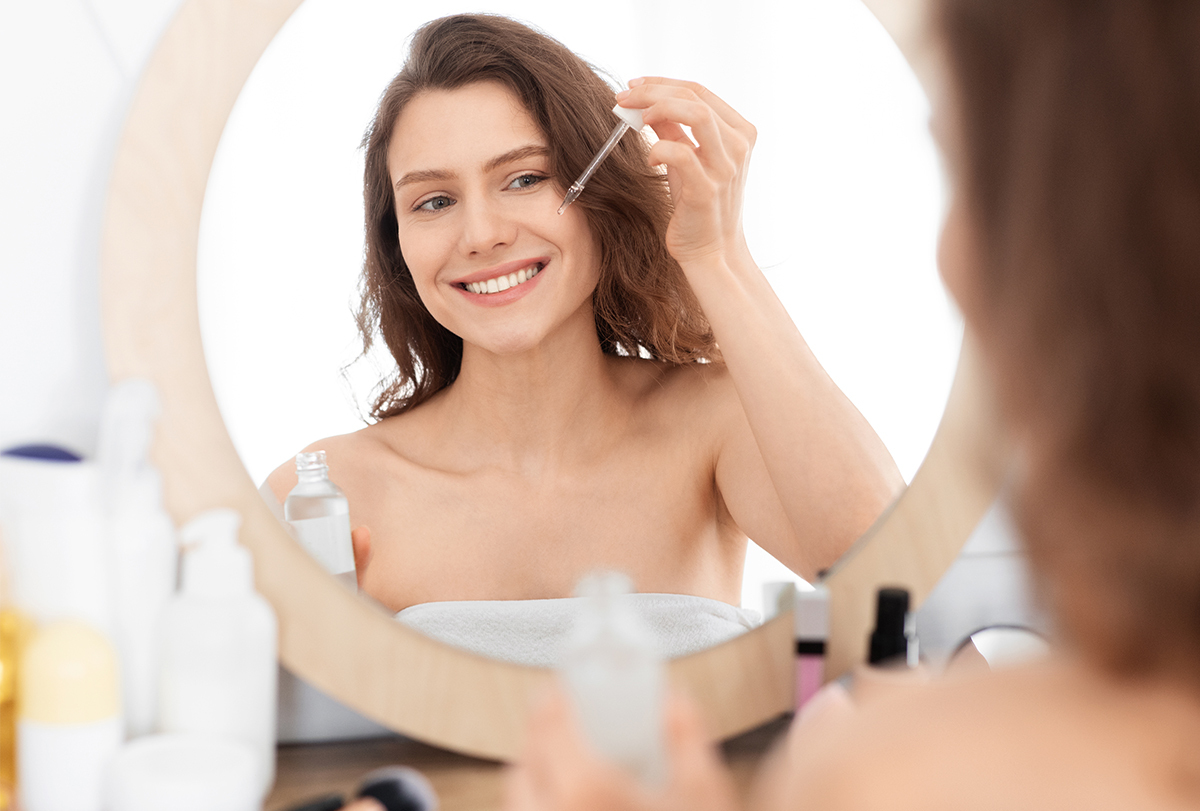
The good thing is that the skin is a self-regenerating organ that has the ability to repair itself, but this is a gradual process. The dead skin cells rise to the surface and are eventually shed into the environment.
Over time, the entire damaged outermost layer of the skin is replaced by newly formed skin from underneath. This skin resurfacing helps fade scars and hyperpigmentation to maintain a bright and even complexion while also keeping your skin tight and supple.
However, as you grow older, the skin’s ability to renew itself declines. This is mainly because the body produces less and less collagen with advancing age. Collagen is the main structural protein that strengthens elasticity and hydrates your skin. (1) For this reason, it is very important to adopt a stringent skin care routine as soon as you enter adulthood.
Dermatological products are formulated with active ingredients that provide different skin benefits. Some hydrate the skin, some offer sun protection, some stimulate cell turnover, and some work as chemical exfoliants. You should include the ones that help address your individual skin concerns.
One such active ingredient is alpha arbutin, which is known to reduce skin hyperpigmentation for a clean and even complexion. Read on to know more.
Alpha Arbutin and Its Mechanism
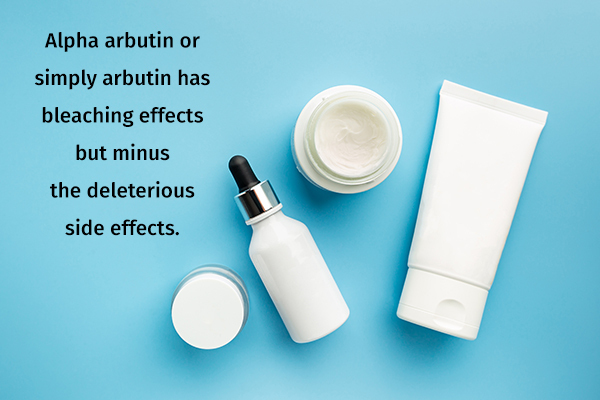
Hydroquinone is a compound that has been widely used in dermatological formulations as a skin-lightening agent, but it has a list of associated side effects.
In fact, some countries have banned its use on the grounds of being a possible carcinogen. Thus, hydroquinone may be quite effective in fighting hyperpigmentation, but is not the safest choice.
Instead, you can try its natural derivative called alpha arbutin, or simply arbutin, which also induces similar bleaching effects but minus the deleterious side effects.
Both these compounds work in the same way to curb melanin synthesis. They get absorbed into the skin and block the release of an enzyme called tyrosinase, which is needed to stimulate melanin production. (1)
Skin Benefits of Alpha Arbutin
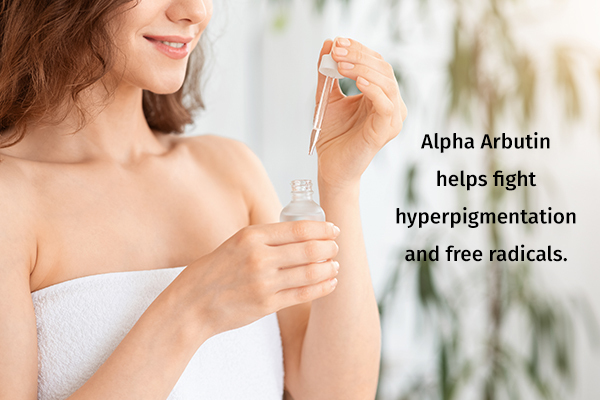
Here’s why you should include alpha arbutin in your skin care routine:
1. Fights hyperpigmentation
Alpha arbutin helps inhibit melanin synthesis to fade tanning, age spots, post-inflammatory hyperpigmentation, and other types of skin darkening to brighten and even out your complexion.
2. Fights free radicals
Alpha arbutin exhibits antioxidant properties that help neutralize the harmful skin-damaging activity of free radicals. Free radicals are unstable molecules present in the environment that enter the body and attack the healthy cells, including skin cells.
How to Use Alpha Arbutin
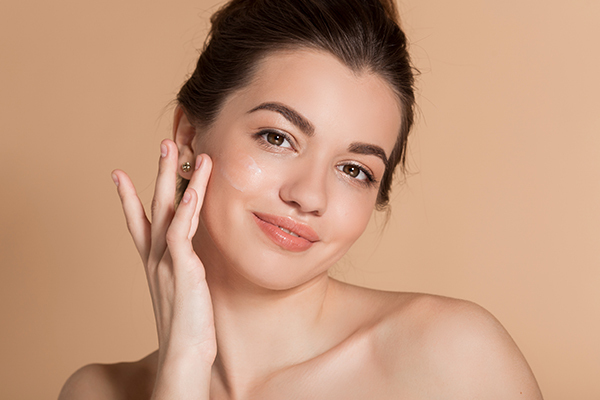
Alpha arbutin is commonly available in the form of a facial serum or cream. The correct way to apply it is as follows:
- Cleanse and wash your face and neck.
- Once your skin is dry, massage a tiny amount of the serum all over your face and neck.
- Wait for a few minutes so that the product gets properly absorbed.
- Apply a moisturizer all over your face and neck.
- Follow it up with a broad-spectrum sunscreen with SPF 30 or higher.
You can also combine alpha Arbutin with other active ingredients to gain more skin benefits. It can safely be paired with vitamin C (ascorbic acid), azelaic acid, niacinamide, kojic acid, or retinol.
Incorporating retinol into your evening skin care routine will help brighten your skin by increasing cell turnover, which lifts away dead skin cells and reveal a fresher complexion. (2) Alpha arbutin can be used on every skin type and does not make the skin sensitive to the external environment. (3)
Excess Melanin Caused by Sun Exposure
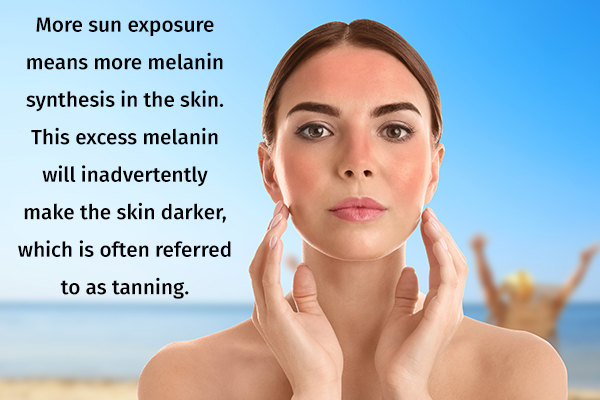
Sun exposure is a major source of skin damage. Sunlight contains UV rays that go deep into the skin, break down collagen, and damage the skin cells down to their genetic level. In fact, unprotected sun exposure for a prolonged period can even give rise to skin cancer.
Fortunately, the skin has a natural mechanism to protect itself from solar radiation. It contains specialized cells called melanocytes that secrete a pigment called melanin, which performs two important functions:
- Gives the skin its natural color
- Absorbs the UV rays to keep them from penetrating deeper into the skin
Thus, when sunlight falls on your skin, the melanocytes in the exposed area get automatically stimulated to produce melanin to absorb the UV rays. More sun exposure means more melanin synthesis in the skin. This excess melanin will inadvertently make the skin darker, which is often referred to as tanning.
In some cases, the excess melanin may concentrate in small areas and appear as dark spots on the skin surface. These are generally called age spots and mostly occur on sun-exposed body parts such as the face and the top of your hands.
Most-Asked Questions About Alpha Arbutin
At what concentration must alpha arbutin be used on the skin?
Alpha arbutin is safe for topical application at a concentration of 2%–4%. Anything more potent than that can irritate the skin and even cause burns, redness, and itching.
Does alpha arbutin darken the skin?
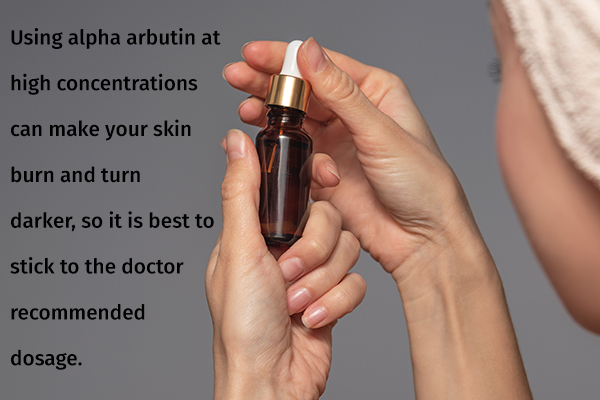
Using alpha arbutin at high concentrations can make your skin burn and turn darker, so it’s best to stick to the doctor-recommended dosage. (4)
Final Word
Alpha arbutin has gained a lot of popularity in the world of skin care, with more and more people using it to fight hyperpigmentation.
It can help fade skin tan, age spots, and other blemishes by curbing the production of excess melanin. By virtue of this property, this active ingredient can help you achieve a healthy and even skin tone.
However, bear in mind that alpha arbutin is not a magic ingredient that will start showing results in a few days. You have to use it properly and regularly to achieve the desired effect. So be patient and consistent.
- Was this article helpful?
- YES, THANKS!NOT REALLY


